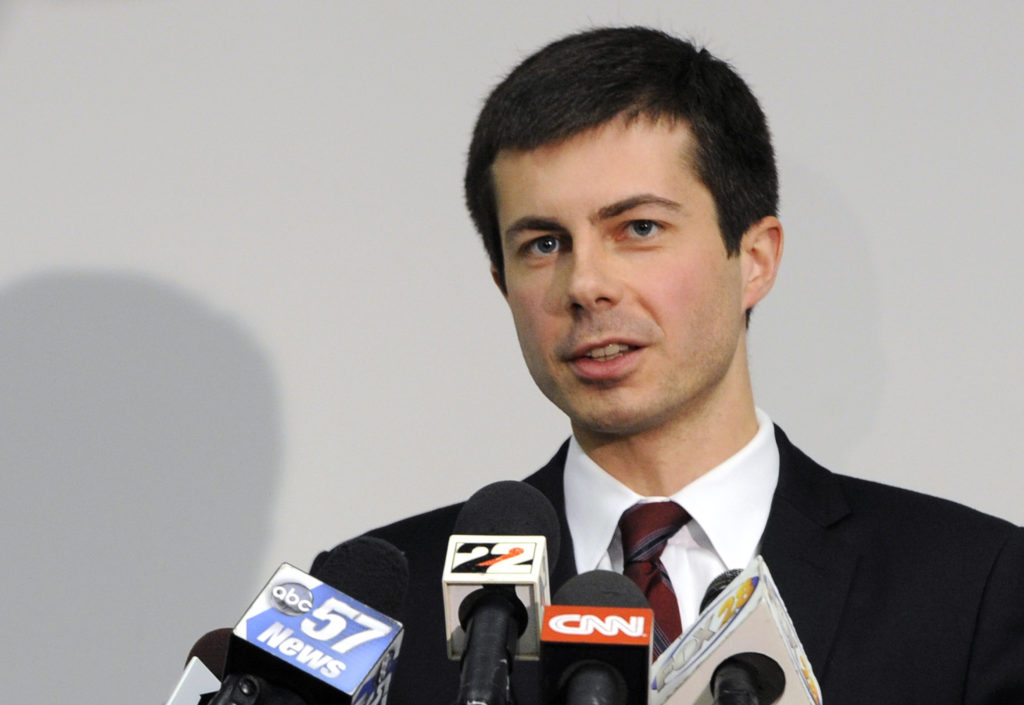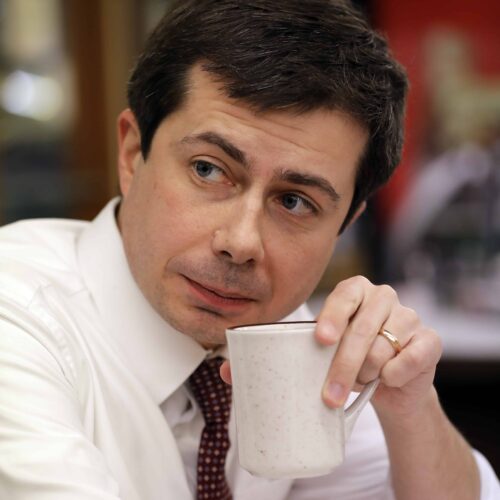This article is published in partnership with TYT.
Introduction
The Center for Public Integrity is a nonprofit newsroom that investigates betrayals of public trust. Sign up to receive our stories.
Pete Buttigieg has been slow to match other presidential candidates’ pledges to swear off big money in politics.
At one point, Buttigieg was the only major Democratic presidential candidate still accepting money from lobbyists. Like many of the other Democratic candidates who once took lobbyist money, Buttigieg has since reversed his stance and refunded more than $30,000 from federal lobbyists. He promised that special interests would have no influence on his candidacy or would-be presidency.
But Buttigieg has nonetheless continued to rely on wealthy and well-connected “bundlers” to help him fundraise — and to great effect, raising more money of late than most other 2020 presidential candidates.
A clue as to why Buttigieg has engaged in the traditional trappings of campaign fundraising comes from early in his political career: his first mayoral campaign, before he became Mayor Pete, the leader of South Bend, Indiana.
Buttigieg’s earliest big-dollar campaign bankrollers include numerous lobbyists and prospective government contractors interested in doing business with South Bend, according to campaign finance records obtained by TYT.
An analysis by TYT and the Center for Public Integrity of the 2011 pre-primary filing also found Buttigieg’s early supporters represented a wide swath of the electorate, from students to retirees. South Bend voters first elected Buttigieg mayor in November 2011, and he took office in January 2012.
TYT previously reported that Saint Joseph County, Indiana, had destroyed Buttigieg’s 2011 campaign finance disclosure forms in accordance with Indiana state law. The Buttigieg campaign has not responded to requests to release the documents. The authenticity of the 2011 pre-primary filing obtained by TYT could not be verified independently, because the originals no longer exist, but neither the campaign nor more than a dozen listed donors contacted by Public Integrity and TYT disputed it.
In a statement to Public Integrity and TYT, Buttigieg campaign spokesman Sean Savett said, “When Pete first ran for mayor, he had strong grassroots support from his friends and neighbors in South Bend, as well as his friends and contacts, to support his campaign to give South Bend a fresh start, create economic opportunity, confront the city’s challenges and move his community forward.”
On Buttigieg’s first day as mayor, he put out an executive order establishing a city code of ethics on matters such as receiving gifts, conflicts of interest, soliciting political contributions, and nepotism. Some of the new guidelines specifically addressed people who had or sought to have a business relationship with the city.
Asked about several executives and companies that donated to his campaign and later got business from South Bend, the campaign said, “Their support of the mayor’s campaign played no role in the contracts their companies received.”
Early lobbyist support
At least 19 names on Buttigieg’s mayoral 2011 pre-primary filing were those of former or current registered federal lobbyists who have tried to influence lawmakers on issues ranging from the environment to construction.
According to the Buttigieg campaign, those lobbyists, “include some of his friends from college and grade school, the former Director of Harvard’s IOP [Institute of Politics] — which Pete was involved in as a student — as well as people active in Indiana Democratic politics.”
Although Indiana does not require lobbyists to disclose their specific contacts with public officials, the 2011 campaign filing shows that Buttigieg did receive money from at least one lobbyist whose firm later did business with the city of South Bend.
In March 2011, a lobbyist named Brad Queisser gave Buttigieg $250 for his mayoral campaign. Quiesser was from Indiana, and had been active in the state Democratic Party.
The Buttigieg campaign told Public Integrity and TYT that Queisser “is very well-known in Indiana politics and has been an active supporter of a number of candidates over the years.” The campaign said Queisser beneficiaries included former Sens. Joe Donnelly (D-Ind.) and Evan Bayh (D-Ind.), Rep. Andre Carson (D-Ind.) and former Rep. Baron Hill (D-Ind.).
In 2011, however, Queisser was based in Washington and working for a lobbying firm called mCapitol, (where Hill had also worked from 2004 to 2006). On March 31, 2011, the same week as Queisser’s donation, the federal political action committee for mCapitol and its parent company — an engineering firm called MWH — gave Buttigieg $1,000.
MWH had given to Buttigieg before, when he unsuccessfully ran for state treasurer in 2010. During that campaign, MWH’s PAC gave an in-kind contribution, valued at $2,577.82, as well as $1,000 cash, according to state and federal campaign finance records.
MWH PAC’s federal disclosure forms show it made subsequent contributions to Buttigieg of $1,000 in May 2011 and $1,000 in July 2011.
On Oct. 1, 2012, mCapitol registered to work as a federal lobbyist on behalf of Buttigieg’s mayoral administration. The registration form lists Queisser as the sole lobbyist expected to represent South Bend’s interests to federal officials in Washington, D.C. Over the next three years, South Bend would pay mCapitol $230,000 for its work lobbying the federal government.
MWH, mCapitol’s parent firm, also got work from South Bend. Just before Buttigieg took office in 2012, the city had agreed to overhaul its sewer system, in response to pressure from both the Environmental Protection Agency and the Justice Department.
In September 2014, the city’s Board of Public Works retained MWH to find as much as $200 million in potential savings in the city’s half-billion-dollar sewer-rehabilitation plan. The contract was worth $2 million.
In 2013 and 2014, the MWH PAC donated another $6,000 to Buttigieg’s 2015 re-election campaign. That was followed by $2,000 in 2015.
By March 2016, MWH had identified $315 million in possible cost cuts. Four months later, MWH won an additional $430,000 from the city for its sewer work.
The Buttigieg campaign said the city hired MWH “under pressure from the Common Council” to reduce costs. The Buttigieg administration “worked with MWH Global after it was selected to reduce the flow of raw sewage into the river by more than 80% while saving the city more than $500 million.”
The MWH sewer contract included subcontracted work performed by a company called American Structurepoint. The 2011 filing obtained by TYT shows that Marlin Knowles, a part-owner of American Structurepoint until at least 2014, gave Buttigieg $1,500 in March 2011.
The Buttigieg campaign cited industry recognition American Structurepoint has received for its work on the Smart Streets project. Neither American Structurepoint nor Bose Public Affairs, which bought mCapitol, responded to requests for comment.
Another one of Buttigieg’s 2011 donors was Thomas New of Indianapolis. New had also given $1,500 to Buttigieg’s statewide campaign in 2010. New was a registered federal lobbyist at the time.
New was also a Democratic Party veteran who had served as campaign manager for Gov. Frank O’Bannon. For his 2010 donations, New listed his occupation as lawyer. He listed no occupation on the disclosures for his 2011 donation, but he joined the law firm Krieg DeVault as executive director of government affairs in 2009.
Krieg DeVault went on to do work for South Bend including being retained to help the city deal with federal authorities on its sewer plan. The firm did not respond to a request for comment and New could not be reached for comment.
Government contractor donations
Indiana is a state with relatively lax campaign-finance and pay-to-play laws (one city’s attempt to enact a pay-to-play ordinance ran afoul of state law that restricts such measures).
South Bend-area contractors, who stood to benefit from doing business with the city, appear throughout Buttigieg’s 2011 list of mayoral pre-primary contributors.
Public Integrity and TYT identified a number of them that later ended up getting lucrative business from Buttigieg’s mayoral administration.
One 2011 Buttigieg backer, John Martell, gave $500 to Buttigieg’s mayoral campaign in March that year, the pre-primary filing shows. Martell also appears in some of the state business filings for a company called Main Street Row, which made in-kind donations of office space valued at $7,400 for the 2011 mayoral campaign, according to the filing.
In 2014, Martell’s company, Martell Electric, won a $780,000 contract from the city as part of Buttigieg’s Smart Streets initiative. The Martell bid was approved by the Board of Public Works, which Buttigieg appoints.

Martell Electric continues to win business from the city. City records show South Bend paid the company more than $6 million for work last year. The Buttigieg campaign pointed out that Martell had done business with South Bend before he became mayor, and that Martell lost out on at least two bids during his administration. Martell Electric did not respond to a request for comment.
DLZ, a major Indiana construction firm that operates under a number of names, gave Buttigieg $750 in the 2011 pre-primary period. DLZ executive Joseph Zwierzynski had given $600 to Buttigieg’s treasurer campaign and donated another $100 to his 2011 mayoral race.
In 2015, DLZ won a city streets contract for $303,000. South Bend also retained DLZ to oversee its revamp of police and other emergency facilities.
In a statement, DLZ referred to its more than 100 years doing business in South Bend and said it “takes pride in providing the community quality engineering and architectural services at highly competitive fees, and has done so for many years prior to Mayor Buttigieg holding elected City office.”
The company continued: “DLZ’s employees, including Mr. Zwierzynski, are South Bend residents and taxpayers. Contributions to Mayor Buttigieg’s campaign complied with Indiana state election laws.”
The Buttigieg campaign cited the fact that DLZ has a local presence in South Bend, and has been ranked among the top design firms in the Midwest.
‘This kid’s really got it together’
Public Integrity and TYT contacted numerous donors who gave $1,000 or more to Buttigieg’s mayoral campaign from 2010 to 2011.
What motivated them to financially boost his mayoral campaign? And will their support extend to Buttigieg’s presidential campaign now, as he polls nationally better than most of the massive field of two-dozen Democratic candidates — but generally behind former Vice President Joe Biden and Sens. Elizabeth Warren, Kamala Harris and Bernie Sanders? Buttigieg has been bolstered by strong, back-to-back Democratic debate performances, including his appearance at the July 30 debate in Detroit.
Some early Buttigieg donors told Public Integrity and TYT they were either impressed with his early political efforts or blown away by his intelligence. For others, backing Buttigieg meant taking a leap of faith in his ability to revitalize a city marked with blight and disinvestment.

Ann Stack was among the most generous donors to the rising political star, giving $12,000 in 2010 and 2011.
Stack said she became interested in financially participating in politics once she believed Indiana Republicans were suppressing the vote and using the tools provided by conservative American Legislative Exchange Council, commonly known as ALEC. When President Barack Obama was a U.S. senator, he campaigned in Indiana and became her standard for excellence. Buttigieg meets that standard, she said.
“The man is genuine: moral, ethical, aspirational and believes in the rule of law,” she said. She’s given the campaign the maximum legal contribution for the Democratic primary: $2,800.
Not everyone has retained their Buttigieg fandom, however: A few early donors say his positions on certain issues as a presidential candidate have strayed too far from his days as an upstart mayoral candidate.
Businessman Gary “Duke” Downey told Public Integrity that he is unsure about whether he’ll support Buttigieg as president. He gave $2,500 to Buttigieg’s campaign in 2011. Downey isn’t happy with Buttigieg’s stance on doing away with the Electoral College, the system by which presidents are elected.
“Coastal cities would be choosing our president,” Downey said of axing the Electoral College, stating that the needs and values of places like Indiana wouldn’t count anymore. “That scares the bejesus out of me.”
William Schmuhl, a University of Notre Dame professor, told Public Integrity he supported Buttigieg for both his mayoral runs. His nephew, Mike Schmuhl, ran Buttigieg’s mayoral campaign and is now Buttigieg’s presidential campaign manager.
The family tie is not enough for William Schmuhl to support Buttigieg this go-round.
“The national stage is very different from his experiences of the last eight years,” he said. “Thus far, the positions he has espoused are generally not consistent with mine, and I do not envision supporting him with a vote or with dollars.”
Retired software developer and South Bend redevelopment commission president Marcia Jones contributed $1,000 to Buttigieg’s mayoral campaign in 2011. She’s given $1,000 to his presidential campaign so far.
Jones said she worked with Buttigieg years ago when former Mayor Steve Luecke wanted to put together groups of people to study aspects of running the city in an effort to revitalize South Bend. Jones said Buttigieg wasn’t very vocal during the process, but he was subsequently able to crystalize his thoughts and some weeks worth of conversations into about three sentences.
“I thought, ‘This kid’s really got it together,’” she said.
Who We Are
The Center for Public Integrity is an independent, investigative newsroom that exposes betrayals of the public trust by powerful interests.
Donating to Buttigieg’s campaign was a fairly easy decision after evaluating who else was running against him, Jones said. Her affinity toward his leadership style grew during his mayoral run as she saw Buttigieg’s ability to trust in her commission but also in the people he surrounded himself by. Seeing the city improve under his leadership, she said, has confirmed for her that Buttigieg can make the leap from mayor to president.
John Axelberg, president of General Stamping & Metalworks, also gave $1,000 to Buttigieg in 2011 and $1,000 to his presidential bid. Axelberg said South Bend politics had been a family affair for many years, where “machine politics” were running the show and selecting candidates.
Buttigieg was outside of the party operations and came in with fresh ideas that have made the downtown area more lively. The Republican-turned-independent said, “If you want your vote to count, you vote as a Democrat in South Bend.”
He made his vote for Buttigieg with a hope the young politician’s vision would help reverse the city’s brain drain, improve its relationship with the University of Notre Dame and strengthen basic municipal services at a time when South Bend, like much of the rest of the nation, was struggling to rebound from the Great Recession.
“Downtown was a ghost town after 5:30 p.m. when Pete was elected. Now you see young families walking their dogs and it’s becoming a cool place to live,” he said.
The development that took place during Buttigieg’s mayoralty is a result of his attracting the right investors to rebuild South Bend, supporters say.
Buttigieg’s ability to attract investment is part of what made him an exciting mayoral candidate, said retired business owner Tela Schulman-Hektor.
Schulman-Hektor gave $1,000 to Buttigieg’s mayoral campaign in 2011, and she plans to make a financial contribution to his presidential campaign.
“There are people that will be bought and people that will accept the money and not be bought,” she said. “ If you don’t have money in this race you’re not going to win.”
Read more in Money and Democracy
Money and Democracy
They promise to help families of fallen officers. But they’re mostly paying telemarketers.
A union-backed police charity spends just a sliver of its money on those it purports to serve







Join the conversation
Show Comments
Thanks for your in depth research. After reading your entire article I’m convinced that Mayor Pete has the integrity and brains to properly lead this country. The fact that a college professor doesn’t share all his views tells me that Pete is true to his own views and convictions. Again, integrity. I may not agree with all his ideas but I respect that he got them thoughtfully with the idea to do what’s best for us all. Go, Mayor Pete!
With statewide winner-take-all laws for awarding electors, the needs and values of places like Indiana and 37 other states that vote predictably do not count. Because of current state-by-state statewide winner-take-all laws for Electoral College votes, not mentioned, much less endorsed, in the Constitution . . . Wisconsin Gov. Scott Walker in 2015 was correct when he said “The nation as a whole is not going to elect the next president,” “The presidential election will not be decided by all states, but rather just 12 of them. Candidates have no reason to poll, visit, advertise, organize, campaign, or care about… Read more »
As if any lobbyist conspired to push this dude into national prominence and the Presidency in 2010 based on $1,200 donations. How do we come up with these ridiculous innuendos. This reminds me of the imaginary conspiracy innuendos that deep state forces conspired to put a multiracial kid from Hawaii into the Oval office. Really? Nobody saw either of these individuals coming out of nowhere in politics. I find it disturbing to see a piece with so little evidence seeking to cut a rising political star at the knees under the banner of Public Integrity. To imply that his political… Read more »
Aaron, what a great analysis! Your take on Mayor Pete is spot on. This is indeed a biased hit piece. Fortunately he is catching on nationally despite the efforts of Sanders’s army of supporters and the opinions of groups like The Young Turks, who have despised him from the get-go. I’m a member of his campaign and I truly believe he has what it takes to win the Presidency in 2020.
Thanks. I have grown up in politics since a toddler. Parents delayed kindergarten to join my father on the campaign trail of the Democratic Primary for President in 76, where he was running a large phone bank in Wisconsin for Udall. We were in Milwaukee and the race was so close there that it was one of the few times in US history where a few major newspaper got the results wrong the next morning. It turned the corner of the race and solidified Carter with a path to the nomination. If you want to wire you kids brain very… Read more »
I feel that partnering with an organization whose sole purpose is to attack Democratic candidates not named Bernie Sanders or Tulsi Gabbard really undermines and frankly destroys any integrity that the CPI usually commands. The fact that the media company didn’t even use their full name in their disclosure speaks volumes by itself. I’m disappointed because I usually use the CPI to learn more about issues because they are not an agenda-driven organization. I guess I was wrong about that and need to rethink my position on your website. I suppose it’s more important to tear these people down than… Read more »
Pete is being pragmatic and walking the line between refusing all but small dollar donations ( Warren ) and vacuuming up everything available ( Trump ), without further reform it is an imperfect position to be in . But he has my vote in any case .
Give Trump the BOOT(edge-edge) !
The final sentence sums it all up: ““There are people that will be bought and people that will accept the money and not be bought,” she said. “ If you don’t have money in this race you’re not going to win.” What matters is not whether firm x or individual y has donated for a campaign and profited in some way from a candidate’s decisions later, because a majority of donors – even from the group of large donors – will NOT profit. Instead, what matters is whether the decisions made by a political executive follow a transparent process and… Read more »